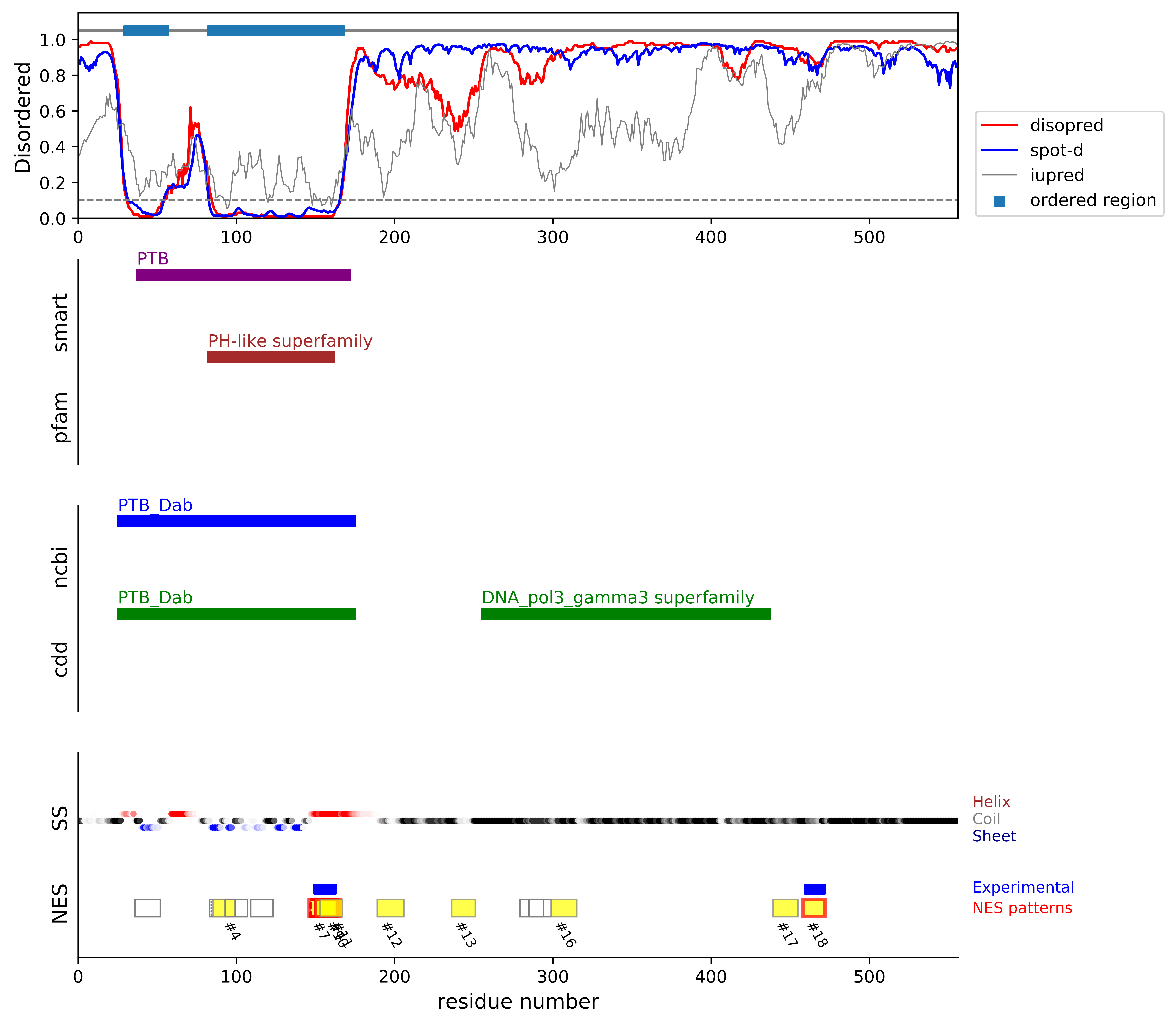

*Experimental: mutation (blue); functional region (cyan); located in the long functional sequence (lightblue)
*NES patterns: region with experimental evidence (red-orange-yellow); false positive region (gray)
| # | candidates | id | start# | sequence | secondary | class | multi-pattern | diso | spotd | iup | loc_DISO | loc_CDD | beta |
|---|---|---|---|---|---|---|---|---|---|---|---|---|---|
| 1 | fp_beta_D | P97318 | 36 | KGEGVRYKAKLIGIDE | CCCCEEEEEEEEEEEE | c1a-AT-4 | uniq | 0.018 | 0.035 | 0.203 | boundary | boundary|PTB_Dab; | 1.0 |
| 2 | fp_beta_D | P97318 | 83 | QKIFLTISFGGIKIFD | CEEEEEEECCCCEEEC | c1a-4 | multi-selected | 0.039 | 0.019 | 0.152 | boundary | MID|PTB_Dab; | 0.571 |
| 3 | fp_D | P97318 | 84 | KIFLTISFGGIKIFD | EEEEEEECCCCEEEC | c1b-AT-5 | multi | 0.031 | 0.016 | 0.143 | boundary | MID|PTB_Dab; | 0.429 |
| 4 | fp_D | P97318 | 85 | IFLTISFGGIKIFD | EEEEEECCCCEEEC | c2-5 | multi-selected | 0.025 | 0.014 | 0.136 | boundary | MID|PTB_Dab; | 0.429 |
| 5 | fp_D | P97318 | 93 | GIKIFDEKTGALQH | CCEEECCCCCCEEE | c3-AT | uniq | 0.023 | 0.028 | 0.213 | boundary | MID|PTB_Dab; | 0.286 |
| 6 | fp_beta_O | P97318 | 109 | AVHEISYIAKDITD | CCCEEEEEECCCCC | c3-AT | uniq | 0.012 | 0.019 | 0.245 | ORD | MID|PTB_Dab; | 0.857 |
| 7 | cand_D | P97318 | 146 | AAEPVILDLRDLFQLIY * * * * | CHHHHHHHHHHHHHHHH | c1c-4 | multi-selected | 0.011 | 0.042 | 0.11 | boundary | boundary|PTB_Dab; | 0.0 |
| 8 | cand_D | P97318 | 147 | AEPVILDLRDLFQLIY * * * * | HHHHHHHHHHHHHHHH | c1d-4 | multi | 0.011 | 0.041 | 0.104 | boundary | boundary|PTB_Dab; | 0.0 |
| 9 | cand_D | P97318 | 150 | VILDLRDLFQLIYELK * * * * | HHHHHHHHHHHHHHHH | c1aR-5 | multi-selected | 0.022 | 0.043 | 0.125 | boundary | boundary|PTB_Dab; | 0.0 |
| 10 | cand_D | P97318 | 150 | VILDLRDLFQLIYE * * * * | HHHHHHHHHHHHHH | c3-4 | multi-selected | 0.014 | 0.039 | 0.11 | boundary | boundary|PTB_Dab; | 0.0 |
| 11 | fp_D | P97318 | 153 | DLRDLFQLIYELKQ * * * | HHHHHHHHHHHHHH | c3-4 | multi-selected | 0.031 | 0.05 | 0.138 | boundary | boundary|PTB_Dab; | 0.0 |
| 12 | fp_D | P97318 | 189 | LEEDVEDPVYQYIVFEA | HCCCCCCCCCCCCCCCC | c1c-4 | uniq | 0.771 | 0.893 | 0.296 | DISO | boundary|PTB_Dab; | 0.0 |
| 13 | fp_D | P97318 | 236 | KSQPVSAVTQLELFG | CCCCCCCCCCCCCCC | c1b-4 | uniq | 0.589 | 0.95 | 0.43 | DISO | boundary|DNA_pol3_gamma3 superfamily; | 0.0 |
| 14 | fp_D | P97318 | 279 | LPGSADVFGSMSFGT | CCCCCCCCCCCCCCC | c1b-AT-4 | uniq | 0.778 | 0.951 | 0.389 | DISO | MID|DNA_pol3_gamma3 superfamily; | 0.0 |
| 15 | fp_D | P97318 | 285 | VFGSMSFGTAAVPS | CCCCCCCCCCCCCC | c3-AT | uniq | 0.804 | 0.946 | 0.311 | DISO | MID|DNA_pol3_gamma3 superfamily; | 0.0 |
| 16 | fp_D | P97318 | 299 | GYVAMGAVLPSFWGQQ | CCCCCCCCCCCCCCCC | c1aR-4 | uniq | 0.929 | 0.904 | 0.278 | DISO | MID|DNA_pol3_gamma3 superfamily; | 0.0 |
| 17 | fp_D | P97318 | 439 | TSEAFSSYFNKVGVAQ | CCCCCCCCCCCCCCCC | c1a-4 | uniq | 0.955 | 0.909 | 0.493 | DISO | boundary|DNA_pol3_gamma3 superfamily; | 0.0 |
| 18 | cand_D | P97318 | 458 | DCDDFDISQLNLTP * * * * | CCCCCCCCCCCCCC | c2-4 | uniq | 0.879 | 0.87 | 0.741 | DISO | boundary|DNA_pol3_gamma3 superfamily; | 0.0 |
*candidates: NES candidates and false positives annotated with "cand" and "fp", respectively;
if the segment is located in the disordered or boundary region, flagged with "D"; if the segment is located in the ordered region, flagged with "O";
if the segment's beta-strand content is over 0.5, flagged with "beta".
*sequence: Hydrophobic positions are colored in red. The positions with the experimental evidence is marked with '*' (mutation) and '+' (functional sequence in NESdb or sites in validNES).
The positions with '.' are for the region annotated in the long (more than 25 residues) functional sequence or site.
*multi-pattern: the consensus pattern is unique or multiple within the region (if the start# difference is less than 5, the segments are considered to be the same region)
*diso: average DISOPRED3-predicted disorder propensity for the segment
*spotd: average SPOT-Disorder-predicted disorder propensity for the segment
*iup: average IUPRED2A-predicted disorder propensity for the segment
*loc_DISO: location of the segment with respect to the ordered/disordered regions
*loc_CDD: location of the segment with respect to the conserved region annotated in the Conserved Domain Database (CDD)
*beta: beta-strand content in the middle of the segment